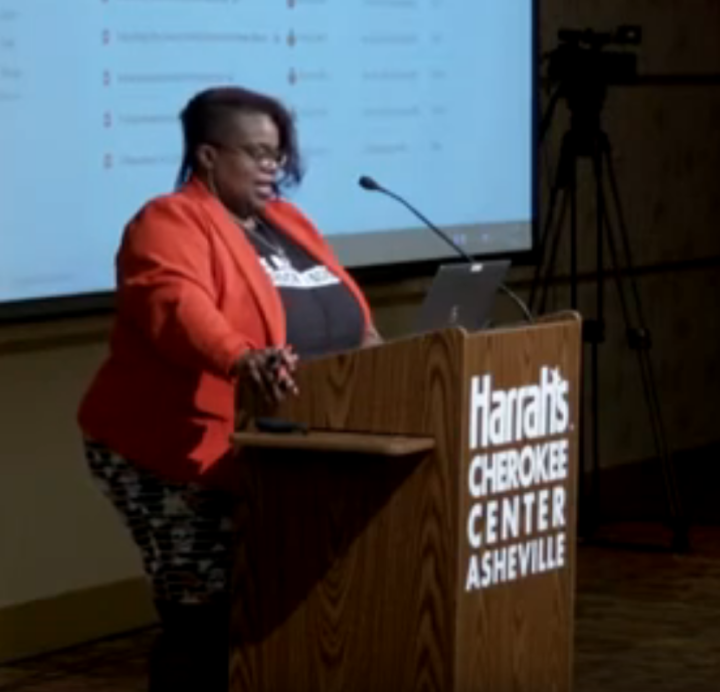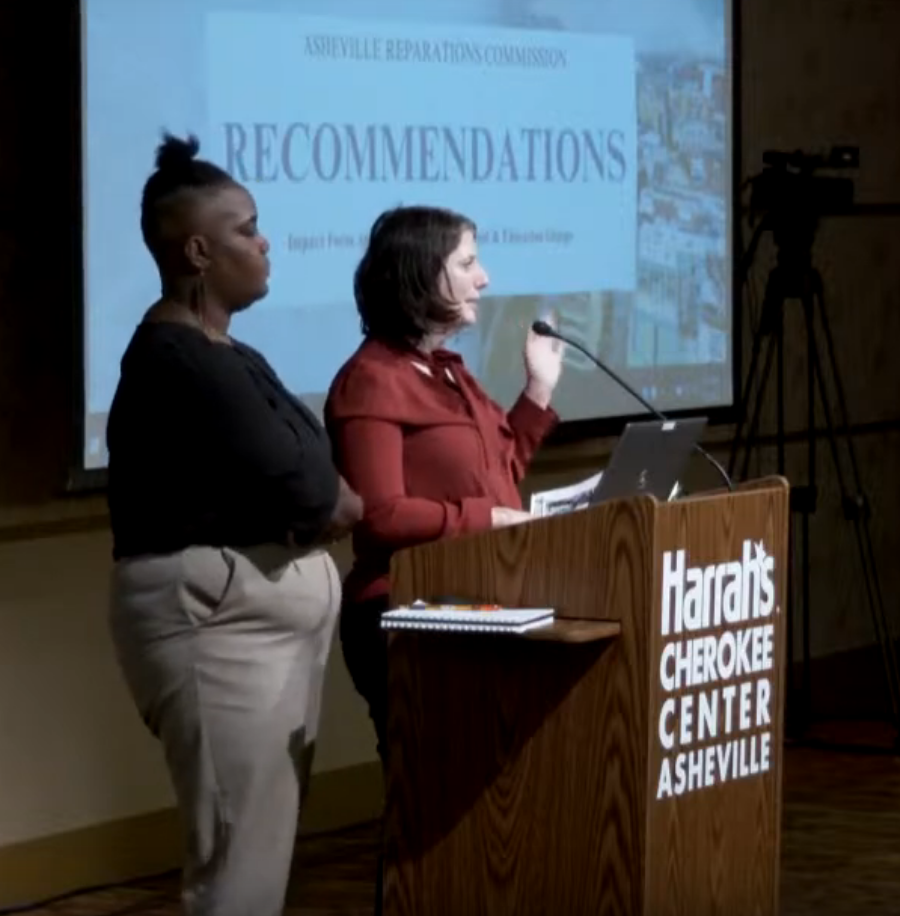The Community Reparations Commission is starting to home in on concrete recommendations for how local governments should atone for generations of systemic racism in Asheville and Buncombe County. The latest example: At their Dec. 4 meeting, commissioners discussed at length a desire to use reclaimed city- and county-owned land to establish a centralized campus for needed services.
A joint recommendation drawn up by education and economic development focus groups from the commission concentrated primarily on what facilitators called an “education resource campus” to provide a place where Black folks know they could access resources for everything from specialized classes to prenatal and elder care.
“We know that education is a building block to be able to do whatever you want in your life. And we know that the literacy rates alone in this community already don’t set up Black kids to be able to do whatever they want in their life, and they’re not being taught,” said facilitator Amieris Lavender, who represents the education focus group. “What do our kids need to have in order to be able to access the resources that are in our community? There’s plenty of programs, and there are resources, and yet when you walk into them, you might not see us.”
Lavender said the commission had gotten feedback from Black residents who felt there had been a loss of places for Black residents to meet with each other and dependably access resources.
“We want to make sure that we’re encouraging collaborative solutions, that there’s no lost opportunities and that we can combat the deep trauma that has been inflicted upon the Black community through years of systemically racist policies that were implemented by city and county entities,” she said.
The proposed campus would be managed and staffed by Black people as much as possible and provide free and ongoing services to past and current Black residents of Buncombe County, according to the facilitators’ presentation. The campus would house prenatal nutrition classes, child care services, supplementary education programs and health care for K-12 students, reentry strategies for those who were formerly incarcerated, adult and continuing education classes, elder care programs and more.
“The goal of this campus is that [it’s] sort of like a one-stop shop or a place where all [of people’s] needs can be met, where there’s a network of support services for folks in this community so that folks don’t have to run around town to have access to resources, but they’re co-located,” Lavender said.
Facilitator Tara Brown presented a corresponding proposal for a centrally located economic development center for Black Asheville with commercial space for entrepreneurs, job training, financial education and a Black-owned financial institution.
Brown also shared ideas from the economic development focus group to put $250,000 in grant funding toward each legacy neighborhood to create business corridors, or hubs, near Black residential areas. That amount is flexible depending on the specific needs of each neighborhood, Brown said.
During the discussion, several commission members suggested the education campus and economic development hubs could overlap.
Commission member Joyce Harrison suggested they create a community with everything people need, from grocery stores to doctor’s offices and schools, and make it self-sustaining by inviting non-Black dollars to be spent in the community.
Commission Chair Dwight Mullen said it was important to find a way to keep any campus or hub from being gentrified as many areas have been in the past.
But the majority of the conversation revolved around how — and where — the commission could find land to use for any campus or resource hub.
“The programs will come, but in order for us to get it going, we need to have this brick-and-mortar now,” said Tiffany DeBellot, commission alternate, to murmurs of approval from other members. She suggested the commission consider using existing underutilized city and county properties.
Brown highlighted three areas affected by urban renewal — Southside, East End/Valley Street and the Hill Street area of Montford — as potential target areas for a campus or hub, based on a City of Asheville project listing all city-owned property acquired as a result of urban renewal.

Commission member DeWayne Barton said there are already community centers in many of these areas, and they should consider what already exists before starting something from scratch.
Commission member Jesse Ray questioned whether physical land was needed at all if there are not enough contiguous parcels left following urban renewal to build something new.
“I’m just saying that I think as we move forward, we examine more deeply what we want to present to the community. Is it the physical position of the hubs or the access to the services that we want to have?”
The commission’s focus group meetings continue through the winter, and the next full commission meeting is Monday, Jan. 22.
Timeline extension update
At the beginning of the Dec. 4 meeting, Noreal Armstrong, chief human rights and equity officer for Buncombe County, told the commission that county staff would extend communications, data and legal support for the commission at its current level through June 2024. Armstrong’s department could continue to provide support beyond that date, but other service levels would decline at that time.
Previously, the reparations commission had requested a timeline extension to complete its recommendations from the original April 2024 deadline until December 2024. The commission opted not to provide a justification to city and county staff to take back to their respective governmental bodies for why the extension was needed.
“In the absence of a [reparations commission] justification for the extension, staff reviewed the timeline progress to date and to completion to provide county leadership with relevant information and context for the extension request,” Armstrong said.
Data requests, managed by county staff, are 98% complete, recommendations are being finalized and the cease-the-harm audit findings will be presented over the next two months, all of which factored into the county’s decision for a modest extension, she said.
Brenda Mills, equity and inclusion director for the City of Asheville, said Asheville City Council will review the reparations commission’s extension request and the county’s decision at its next meeting, Dec. 12.
Vice Chair Dewanna Little asked Armstrong and Mills if representatives of the commission could get on the agenda of a City Council or Buncombe Board of Commissioners meeting to more thoroughly explain the progress. Both staff members said anyone could come to public comment, but they would ask their staff if getting on the agenda was possible.




Breaking news! AstraZeneca pharmaceutical company has just gotten FDA approval for a new drug they are naming:
Novictimuenza. It comes in 50 mg tablet forms; one dose a day before breakfast.
This new drug is effective in signficantly reducing symptoms and feelings of victimization in individuals. Instead of always feeling like the world is against you, this medicine will provide feelings of self worth, renewed resourcefulness but most importantly, a feeling of taking personal responsiblity for one’s life. Symptoms of dependency on others or society in general, are greatly reduced. Anger against past distant grievances is greatly reduced so that the patient can focus on moving forward in the world and not regressing into self pity, anger and stalled personal improvement.
Expected release date: January 1, 2024
It’s long past due!